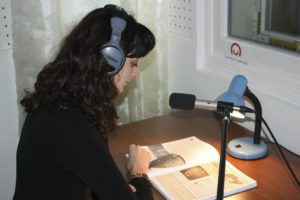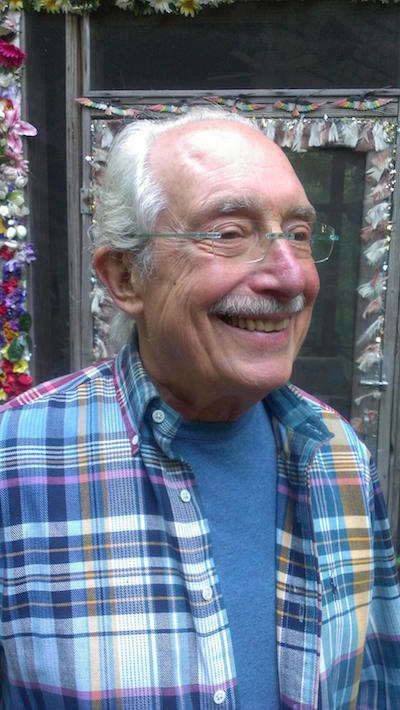Blind in the City: Not as Dark as It Sounds
March 10, 2018 • 4 Comments • Posted in blindness, parenting a child with special needs, public speaking, visiting schoolsThat’s the title of the talk I’ll be giving for the Vivette R. Rifkin Seminar this Thursday, March 15, 2018 at 12:30 p.m. at the University of Illinois Chicago (UIC). The event is free, and the public is invited. Come on over! I’ll give more details below, but first, some background about the woman the seminar is named for.

Thanks to Vivette Rifkin and other readers, students with visual impairments got their textbooks in audio on a timely basis.
Vivette R. Rifkin (1911 – 2007) founded Educational Tape Recording for the Blind in the 1960s to help her daughter Jill and countless other people with visual impairments succeed at school. Jill was born prematurely and was left with badly impaired vision. In her younger years Jill attended a special school for children who had disabilities, and when she expressed a desire to attend her neighborhood high school and go on to college, her mother helped by recording textbooks for her. When her daughter started at University of Missouri, Mrs. Rifkin and her team started recording textbooks for students all over the country. From the Chicago Tribune:
What made Mrs. Rifkin’s firm especially valuable was its quick turn-around on book orders. Employing a team of volunteers, and recording for five hours a day herself, Mrs. Rifkin would get students and others the books they needed, even lengthy tomes on science and other subjects, in a matter of days.
Vivette Rifkin herself never had the chance to go to college, but in 1999 the University of Illinois at Chicago (UIC) awarded her an honorary doctorate of humane letters. After Mrs. Rifkin’s death in 2007, her family established the Vivette R. Rifkin Seminar at the University of Illinois at Chicago.
Late last year I was contacted by Keenan Cutsforth, Assistant Dean for Advancement at the UIC College of Applied Health Sciences, to invite me to meet with him and Dovie Horvitz, another of Vivette Rifkin’s daughters, to talk about the 2018 Vivette R. Rifkin Seminar. Over lunch, Dovie told us that her mother had been recording textbooks well into her 90s. “The University of Illinois was right to give her that degree,” Dovie said with a shrug and a smile. “After reading thousands and thousands of college textbooks, she could have been hired to teach classes there!”
Dovie and I really hit it off over lunch that day — how could you not love a woman named Dovie? After lunch she accompanied me to an elementary school in Deerfield to hear me talk with the kids there, and now I’m looking forward to being with her again at the seminar this Thursday. Here are the details :
The 2018 Vivette R. Rifkin Seminar presented by Beth Finke
Blind in the City: Not as Dark as it Sounds
In her presentation, Beth will outline her decision to move from a small community to a large city after losing her sight at age 26. Through her talk, Finke will examine cultural attitudes about disability, reasonable accommodation issues, and the role disability arts and culture movements play in urban life.
Thursday, March 15
12:30 – 1:45 p.m.UIC Lecture Center Building F, F006
807 S. Morgan St.
It is an honor to be asked to give a talk for the 2018 Vivette R. Rifkin Seminar. I hope I do it justice. For more information about this event, directions or other inquiries, contact Keenan Cutsforth, Assistant Dean for Advancement at the UIC College of Applied Health Sciences, at keenanc@uic.edu or 312-966-1339.



